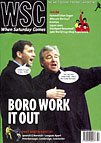 As the Real Madrid star picks up European Player of the Year, Phil Town explains why they're still not happy in Portugal
As the Real Madrid star picks up European Player of the Year, Phil Town explains why they're still not happy in Portugal
“An act of justice!” declared the new Portuguese sports minister, José Lello. He might have been describing his appointment in place of Armando Vara, forced out following a scandal involving public funds. But he was, of course, talking about Luis Figo winning the Golden Ball, the European Player of the Year award organised by France Football.
A week before it had been a different story. When Figo was overlooked in favour of Zinedine Zidane at FIFA’s World Player of the Year jamboree you could hardly breathe for the stench of sour grapes. “It’s true that Zidane won well, but I wanted more and I don’t feel inferior to him… or superior,” said Figo. Referring to Zidane’s role in making France European champions, he added: “Euro 2000, a month-long competition, carried more weight than a year’s work.” But he didn’t want to ruffle any feathers, insisting: “I’m not criticising anybody, I’m just stating a fact.”
Just about everyone thought it was all very unfair. “If Zidane won just because of the Euro title, then his recent red cards should also have been taken into account,” complained FC Porto’s hard man Jorge Costa, of all people. The football federation president Gilberto Madaíl questioned the voting system, suggesting the Figo would have won if voting had been allowed through the internet, rather than simply by the world’s national team coaches. Portugal’s own coach António Oliveira, ever the diplomat, was in no two minds: “Zidane won because Figo isn’t French!”
Others strained to put a brave face on it. “We have to rejoice in the fact that Figo was considered one of the best,” said Carlos Queiroz, South Africa’s coach and Figo’s old mentor at Sporting and in the highly successful national youth teams. Sports daily A Bola’s Vítor Serpa followed a similar line in his editorial: “‘The Best’ becomes a meaningless concept when you’re talking about an elite group whose genius approaches that of the gods.”
The front page of the same edition appeared to contradict this sensible philosophy, however, blaring To Us You’re The Best. Inside they tried desperately to make Figo best at something, finally settling on the idea that on the night he had smiled more and shown better fair play than the other candidates.
The refreshingly cynical Miguel Sousa Tavares, a columnist for the same paper, was one of the very few who saw some legitimacy in the decision: “Why wouldn’t the majority of the voters think that Zidane, and not Figo, was the player of the year, especially if we consider that in the most important showcase of world football this year, Euro 2000, and particularly in the decisive France v Portugal match, Zidane was indeed clearly better than Figo.”
The general feeling, though, was one of bitterness and frustration, seasoned with a liberal dollop of paranoia (Portugal beaten again by “the system”) and an ill-concealed inferiority complex, a mirror image, in fact, of the reaction to the outcome of the semi-final against France, largely perceived here as a travesty. Figo was reflecting and to some extent fuelling these emotions when he said: “This nomination is very important for our small country. It was good to be here, but I wanted so much to win this for Portugal.”
A week later, the press were able to crow “revenge!” when the France Football awards reversed FIFA’s order of bestness. But it was strange that when Figo collected the Ballon d’Or, the Portuguese were almost an afterthought on his list of dedications, preceded by his wife, daughter, Real Madrid players, Barcelona players and the national squad.
Strange too that a man apparently so proud of his country should think it appropriate to make his acceptance speech in… Spanish.
From WSC 168 February 2001. What was happening this month